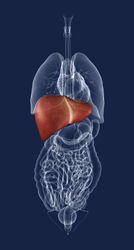Hepatitis C virus - host interactions promote replication
HCV is a positive-strand RNA virus that replicates its RNA in association with human intracellular membranes. Researchers in the 'Subversion of host trafficking machinery by hepatitis C virus to promote viral replication' (HCV HOST TRAFFICKING) further characterized an interaction between the virus and the host cell that is essential for viral replication. It was previously shown that in order to replicate efficiently in hepatocytes, the HCV non-structural protein 5A (NS5A), has to interact with the host protein TBC1D20. TBC1D20 is a GTPase activating protein that regulates Rab1. Rab1 is important for the trafficking of cargo within the cell. Following these findings HCV HOST TRAFFICKING project partners further investigated NS5A’s binding to host membranes and found that in addition to its known association with the endoplasmic reticulum (ER), NS5A can also bind lipid droplets (LDs). LDs are organelles that are essential for HCV production. NS5A was found to recruit TBC1D20 and Rab1 to the vicinity of the LDs. HCV HOST TRAFFICKING members further established that a functional Rab1 protein is essential for LD biogenesis and for viral replication. Thus demonstrating the importance of the NS5A localization in LDs and its interaction with TBC1D20 and Rab1 in promoting the viral life cycle. HCV HOST TRAFFICKING researchers were also involved in a study looking into the role of ADP-ribosylation factor 1 (ARF1), an additional host protein involved in intracellular trafficking, in HCV replication. Exposure of HCV-infected cells to pharmacological ARF1 inhibitors reduced virus production, as did down-regulation of ARF1 gene expression with small interfering RNA (siRNA). Indicating that Arf1 has an important role in the regulation of HCV production. The research initiatives of HCV HOST TRAFFICKING project partners led to a deeper insight into molecular mechanisms of how HCV hijacks the host trafficking systems to augment viral replication. These results might lead to the identification of novel therapeutic targets. Project outcomes were published in several international scientific journals.







